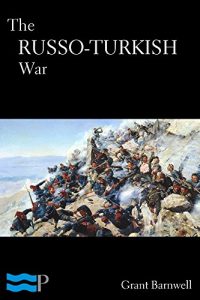Pyrrhus Press specializes in bringing books long out of date back to life, allowing today’s readers access to yesterday’s treasures.
Grant Barnwell’s The Russo-Turkish War documents the 19th century fighting between the Russians and the Ottoman Turks, which had profound implications for all of Europe and was a factor that played into World War I in the early 20th century.
From the preface:
“The eyes of thinking people are now turned to the great struggle in Eastern Europe for the supremacy of the Bosphorus, and to the effort of the Slavonic races of the Danube to throw off the Turkish yoke. The desire of the Russians to possess themselves of Constantinople is as old as the nation itself. It has its origin, not in political ambition only, but in a determination to rescue from infidel bondage their brothers of the Slavonic race and of the Orthodox Church. The position of the Russian Christians under the Tartar domination was very like the present position of the Christians in Turkey. For some time after the conquest, Russia was ruled as Bulgaria is now ; then she obtained her rights and powers similar to those of Servia and Roumania at the present day; and ultimately she gained complete independence. Thus the Russians long formed the vanguard in the cause of Slavonic emancipation. They were the first of the Slavonic people to fall under the Tartar yoke, and the first to emancipate themselves. This they have not forgotten ; and we cannot wonder that they should now sympathize with those kindred races which are striving to follow their example.
Encamped for four centuries in Europe, the Turks have deviated but little from the manners and customs of their Asiatic forefathers. Although, from the day that the cannon of Mohammed the Second opened the breach in the wall of Constantinople—which still exists, to attest the fall of the Emperor of the East—they have been undisputed masters of the fairest and richest dominion upon earth ; yet the great body of them still retain the primitive customs and habits which they brought with them from the mountains of Koordistan. They have in no degree either shared in the improvement, or adopted the manners, or acquired the knowledge of their European neighbors. Notwithstanding their close proximity to, and constant intercourse with, the democratic commercial communities of Modern Europe, they are yet the devout followers of Mohammed ; notwithstanding that they everywhere admit that the star of the Crescent is waning before that of the Cross, they still adhere in all their institutions to the precepts of the Koran. They rely with implicit faith on the aid of the Prophet, although they are well aware that the followers of Christ are ultimately to expel them from Europe ; and themselves point to the gate by which the Muscovite battalions are to enter when they place the cross upon the dome of St. Sophia.
In the present volume it is designed to give to the American reader a succinct account of the relations existing between the two nations now at war, to show the causes which, in their gradual development, have led to the present conflict, and to present a vivid and truthful picture of the social and domestic life, habits, and surroundings of the belligerents. The author has endeavored to avail himself of all accessible sources of information, and from the large accumulation of materials, he has selected only such as will be most likely to interest the general public. The aim has been to make the work comprehensive in scope and full in information ; and the events narrated are brought down to the present date.”
The Russo-Turkish War (English Edition)
Sobre
Talvez você seja redirecionado para outro site












